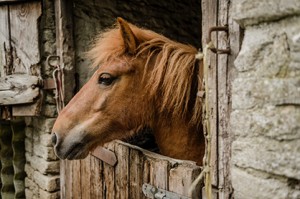Horse Owners Beware of Sycamore Poisoning
Bright Bay press release
Blue Cross is urging horse owners to stay vigilant and keep their horses away from sycamore following the tragic death of one of the charity’s rehomed ponies from Atypical Myopathy (AM), which is thought to be caused by toxins from the seeds of the tree. In this instance the seeds were inadvertently brought on to the new owner’s field by floodwater. The charity, in conjunction with veterinary experts, has put together some tips to help keep horses safe.
Atypical Myopathy is a highly fatal muscle disease in the UK and Northern Europe. It is thought to be caused by caused by the ingestion of hypoglycin A, a toxin contained in seeds from the sycamore tree (Acer pseudoplatanus). An equivalent condition in the USA, referred to as Seasonal Pasture Myopathy (SPM), has been linked to hypoglycin A toxins from the box elder tree (Acer negundo).
British vets have seen an alarming rise in new cases of AM this spring. Young horses appear to be more susceptible as are those being grazed on parched land. Blue Cross vet Natasha Seely of Bourton Vale Equine Clinic in Gloucestershire said, “Horse owners need to be alert at all times but especially during the spring and autumn months. If they are worried that their horse may be showing and symptoms they must call their vet immediately. The signs range from depression, muscle weakness, recumbency, choke or colic-like symptoms to dark red urine. The sooner AM is diagnosed the better the likely outcome.”
Gemma Taylor, Education Officer at Blue Cross, continued, “One of our horses in an experienced loan home unfortunately lost his battle with this fatal disease last week. Although his field did not have any sycamore trees nearby, it is thought that he had ingested seeds brought in by floodwater. This tragic incident has bought it home how horrific this disease can be and how all horse owners have to stay alert to the dangers to try to minimize this dreadful disease.”
The Blue Cross Education Department has worked with veterinary experts at Bourton Vale Equine Clinic to put together some tips to help horse owners prevent AM:
· Feed forage such as hay in parched fields- off of floor in haynets or feed racks
· Do not over stock
· Limit turnout. Ideally stable horses over night
· Section off areas around poisonous trees and collect and dispose of leaves safely away from horses
· Remove young sapling plants
· Be careful of streams running through paddocks as this is thought to be more prevalent in moist places
· Be vigilant of the potential signs of this disease and act quickly if your horse becomes poorly.
· Ensure you check your horse regularly at least 2x daily
· Check your vet insurance is up to date
For more information on Atypical Myopathy please visit BEVA website http://www.beva.org.uk/news-and-events/news/view/438 or visit www.bluecross.org.uk.











